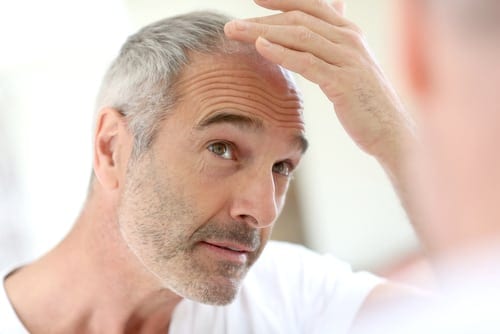 Whether male or female, hair loss is one of the biggest fears people have as they get older. Millions are affected by some extent of hair loss, whether it be male-pattern baldness, general thinning hair on the scalp, or a loss of hair on the eyebrows. There have been many forms of hair loss treatment over the years. From “miracle” creams and pills, to herbal supplements and chemical solutions, the list of hair loss cures goes on and on. But what really causes hair loss?
Whether male or female, hair loss is one of the biggest fears people have as they get older. Millions are affected by some extent of hair loss, whether it be male-pattern baldness, general thinning hair on the scalp, or a loss of hair on the eyebrows. There have been many forms of hair loss treatment over the years. From “miracle” creams and pills, to herbal supplements and chemical solutions, the list of hair loss cures goes on and on. But what really causes hair loss?
Common Causes of Hair Loss
There are many different causes of hair loss, but the most common include, genetics, hormone imbalance, certain medical conditions, poor diet, and stress.
Genetics
Genetics is a major cause of androgenetic alopecia, which is a form of hair loss that commonly results in “male-pattern baldness” in men and is estimated to affect 35 million men in the United States. Women can also develop this form of hair loss, which usually results in generalized thinning of the hair on the scalp.
Hormones
One of the most frequent causes of hair loss is hormones. Obviously, women experience hair loss due to hormone levels more often than men because of things like pregnancy and menopause. However, an imbalance between testosterone and estrogen levels can cause hair loss in men as well.
Medical Conditions
A wide-range of medical conditions can be the main reason hair loss happens in men and women. Among the most common include thyroid problems, skin disorders, and alopecia areata. In some instances, medications for arthritis, depression, and even blood pressure can also be the main reason for hair loss.
Diet
What we eat can have a direct effect on hair loss. The most common diet complications that cause the loss of hair are an overabundance of vitamin A, a deficiency in vitamin B, or too little protein. The good news is, hair loss caused by diet troubles can easily be easily reversed.
Stress
Although less likely than hormones or medical conditions, both physical and emotional stress can interrupt the cycle of hair growth. Events like car accidents, burns, or severe illness are all physical stressors on the body, while emotionally stressful times, like death or divorce, can contribute to hair loss that is already occurring.
Treatments for Hair Loss
During your consultation, your board-certified plastic surgeon will evaluate your head and scalp to determine the right treatment for your hair loss. Such treatment includes:
Platelet Rich Plasma (PRP)
Platelet Rich Plasma (PRP) is an excellent non-surgical option for men and women who suffer from hair loss. PRP is rich in growth factors and stimulates growth of the hair follicles. Blood is drawn, and PRP is separated and then strategically injected into the scalp. Studies suggest that frequent PRP treatments are a way to stimulate inactive or newly implanted follicles to produce natural hair growth.
Hair Transplant Surgery
Most individuals grow healthy hair on the back and sides of their head, and these areas are typically used as donor areas during hair transplant surgery. Follicular Unit Transplantation (FUT) is the most common method of harvesting the donor grafts of hair. Strips of donor hair are surgically removed and then strategically placed in precise positions to effectively recreate a natural pattern of hair in the thinning or balding areas. This method can also be used for eyebrow hair transplantation. Hair transplant surgery is very effective for producing an undetectable result.
If you suffer from hair loss, we can help. Whether it is male-pattern baldness or generalized thinning hair on your scalp or eyebrows, it’s important that you consult a certified hair restoration specialist. Dr. Jason B. Diamond will personally hand select a board-certified surgeon and hair restoration specialist to ensure you receive the safest and most effective hair restoration treatment possible. To schedule your consultation, please call our Beverly Hills practice at (310) 859-9816 or fill out our online contact form today.

